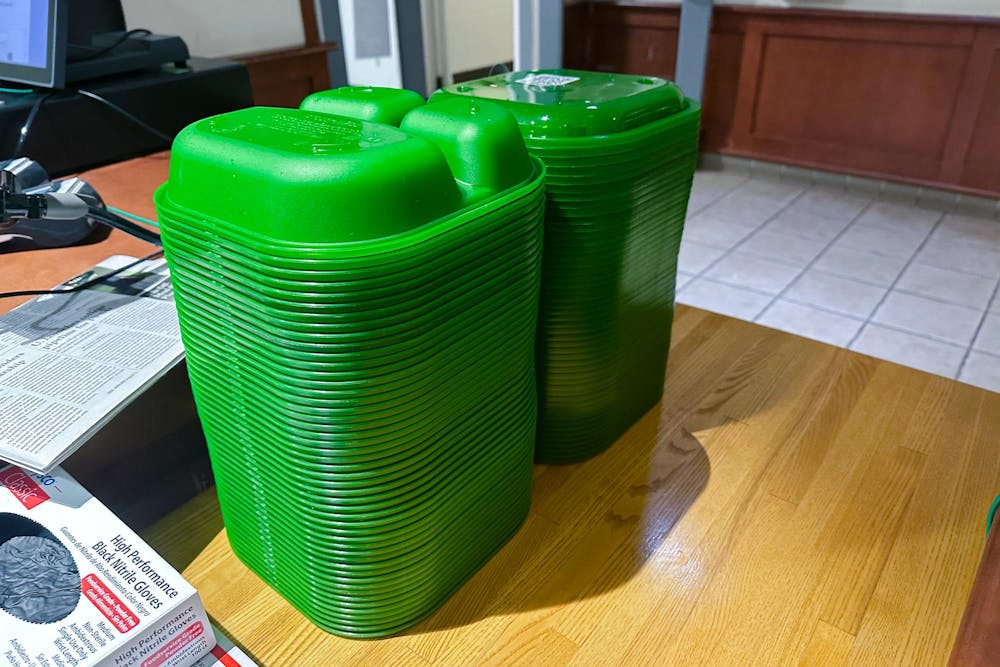Starting this semester, reusable takeout boxes at the Sharpe Refectory and Verney-Wooley dining halls have replaced disposable ones.
The boxes, the product of a new partnership between Brown Dining Services and ReusePass — a program partnering with campuses to offer reusable takeout containers — are part of an effort to reduce waste from dining, according to Director of Wellness and Nutrition Michelle Blais. With roughly 1,400 students already signed up, the program claims to have saved 2,273 disposable containers — amounting to 203 pounds of waste — from going into landfills, according to a Jan. 23 email from BDS.
To participate in the program, students first sign up for ReusePass using an online form. They then receive a digital QR code allowing them to scan for a reusable container at the Ratty or V-Dub. The boxes are due back at the dining halls within five days, and while currently students are not charged for late returns, Blais said that “incentives for returning will be determined on our return rates” once the initial launch is complete.
In December 2022, BDS had its first call with ReusePass to begin planning for the program. According to Blais, ReusePass’s QR code model — which “allowed students to take out a container even if they hadn’t returned their old one yet” — led them to partner with the supplier.
She acknowledged that while the convenience of disposables cannot be replaced, she hopes “that as students adjust to this new process it will continue to grow in popularity.”
For some students, the change is welcome. “I thought it was a good step,” said Angela Xu ’27. “It was something that they should have done earlier.”
Chloe Lau ’27 said that despite her initial “annoyance” with the change, she believes the reusable containers will prove beneficial in the long term.
“It'll make us a little more mindful of our consumption, too,” Lau said. “I find that now with reusable containers, I’m less likely to take my food out.”
But Xu said she was the only one of her friends who had tried out the program, pointing to “the hassle of returning it, especially because there’s a limit of a few days,” as a possible deterrent.
Garrett Brand ’26, a co-hub coordinator for climate action group Sunrise Brown, believes that while the containers are a “net good,” the University’s sustainability efforts would be better served elsewhere.
“It’s ironic and just funny that Brown is trying to play into narratives of individualizing climate action, while they still receive money and research fund donations and research funding from the fossil fuel industry which is destroying the planet,” said Brand.
Brand also cited efforts such as removing paper towels from the dorm bathrooms and the pro-plant-based consumption banners set up across residential dining halls as a misdirection of University resources. “Trying to get individuals to change their habits has always been a distraction playbook,” he said.
Blais declined to comment in response to these quotes. University Spokesperson Brian Clark did not respond to The Herald’s request for comment.
In the Ratty, V-Dub and Andrews dining halls, banners citing the carbon emissions caused by meat production are encouraging students to phase plant-based options into their meals. The University pledged to reduce overall red meat consumption in 2021, and Blais said that BDS is “working with the Office of Sustainability in increasing awareness on the benefits of plant-forward eating, for both students and the environment.”
Some students have questioned the effectiveness of these banners. “I don't think anyone's going to make significant shifts in their diet or their food choices as a result of those signs,” said Lau. Xu and Brand echoed the sentiment.
“It's not a very proactive way of doing it,” said Xu. “I think providing better plant-based options, like those that are more delicious and more appetizing than meat-based options, would be the better solution.”
Lau and Xu both suggested ways in which the dining halls could more effectively achieve their goal of sustainability. Lau said that many students, including herself, are unaware of where their food waste is going, and that making this knowledge more accessible would be a “good next step.” Xu highlighted the use of plastic cutlery at Andrews as an area for growth.
“There's a huge level of personal responsibility with our climate action,” Lau said. “It's on all of us to make sure we have a better world to live in.”
Maya Nelson is a senior staff writer covering undergraduate student life. She’s interested in studying either English or Literary Arts and loves to read sci-fi and fantasy in her free time. She also enjoys playing guitar, crocheting and spending an unreasonable amount of time on NYT Spelling Bee.





